(单词翻译:单击)
(CNN) -- Deep in the untouched areas of Ukraine and Russia live menwho have decided to leave human establishments and live isolated in nature.
(美国有线电视新闻网)——在乌克兰和俄罗斯人迹未至的深山区,那些决定离开人类群体的人正离群索居于此。
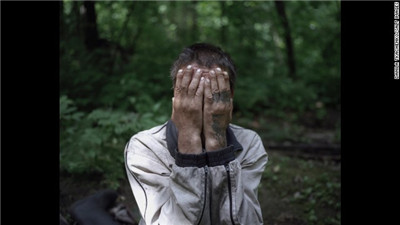
Photographer Danila Tkachenko tracked some of them down by calling local authorities, park rangers, newspapers and nature reserves, though it's difficult to track down a man who has chosen to belost.
摄影师 Danila Tkachenko通过联系有关当局、公园管理员、报社和自然保护区追踪到了他们当中一些人的足迹,虽然要找到一个选择从人们视野中消失的人并非易事。
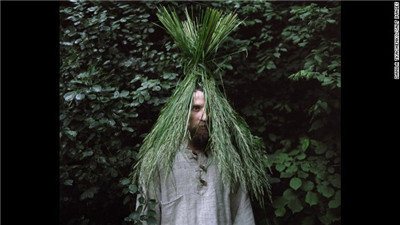
"Often the information is not accurate, so many trips went in vain," Tkachenko said.
Tkachenko说,“他们提供的信息经常是不准确的,很多次追寻之旅都无果而终”。
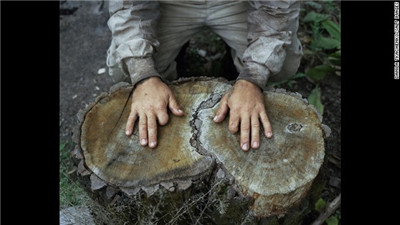
The hermits live in homes made of local resources -- lumber, burrows in the ground or caves -- and eat what they huntor gather. If they fall ill, Tkachenko said, they live with the condition or treat themselves with folk methods. He said one man lost his vision completely but continues to live by himself in the woods.
这些隐士利用当地的资源构筑自己的住所——木材搭建的房子、就低挖洞——食物为打猎和采集所得。Tkachenko说,如果生病了,他们就那么忍着或是使用民间的方法来给自己治疗。他说,有一名男子因此彻底失明,但他仍坚持独自生活在森林里。
Occasionally the men see tourists, hunters or guests like Tkachenko, though typically they arealone.
这些人偶尔会碰见像Tkachenko这样的游客、猎人或来客,不过他们通常都是独自一人。
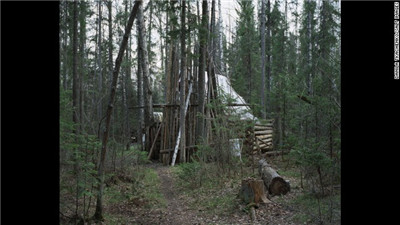
"Communication with people has been broken off and left in the past," he said.
他说,“他们在过去就已经断绝了与人交流”。
The names of the hermits have no relevance because they are extricated socially, Tkachenko said, and he chose to not include them in his photo captions. Many of them don't even have documents, he said.
He spent a few days with each man before taking photos. He chose to shoot on film because it draws less attention and because some of the religious hermits do not like digital technology, he said.
在拍照前,他分别与每人共同度过了数日的时光。他说,他选用胶片拍摄是因为这样做不会引起那么多关注,而有些虔诚的隐逸派也不喜欢数码科技。
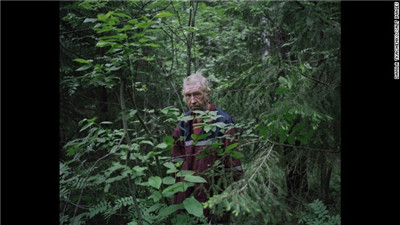
Despite, or maybe because of their isolation, Tkachenko found that the men were open and talkative.
尽管他们离群索居,但或许也正因为如此,Tkachenko觉得这些人心扉敞开且很健谈。
"They are close to nature and live in harmony with it," he said. "For them, it is freedom."
他说,“他们亲近自然,并与自然和谐相处。对他们来说,这就是自由”。
Tkachenko grew up in a city but has always been drawn to nature.
Tkachenko在城市中长大,但他总是受自然界吸引。
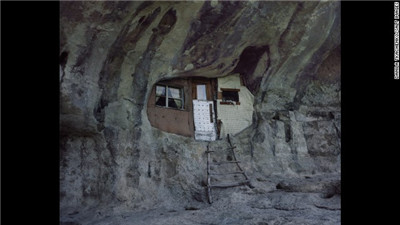
"For me it's a place where I can hide and feel the real me, my true self, out of social context," he wrote in his project description.
他在自己的摄影描述中写道,“对我来说,自然是我的藏身之处,在这里我能感受到社会之外的真实的自己”。
He wrote that he is concerned with internal freedom and whether it is possible when constrained by social obligations and schedules.
他写道,他关心内心的自由,在意受到社会义务和安排的约束后是否还能获得这份自由。
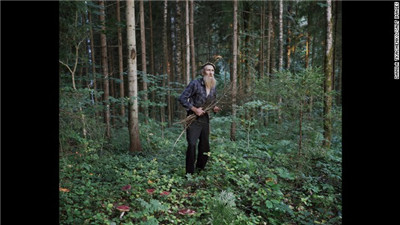
"School, work, family -- once in this cycle, you are a prisoner of your own position and have to do what you'resupposed to," he said. "You should be pragmatic and strong, or becomean outcast or a lunatic. How (do you) remain yourself in the midst of this?"
他说,“学校,工作,家庭——一旦进入这个圈子,你就成了自己身份的俘虏,不得不做你应该做的事情。你就得变得强大实际,要不就会变成受到驱逐的疯子。在这样的处境中你如何保持自我”?


